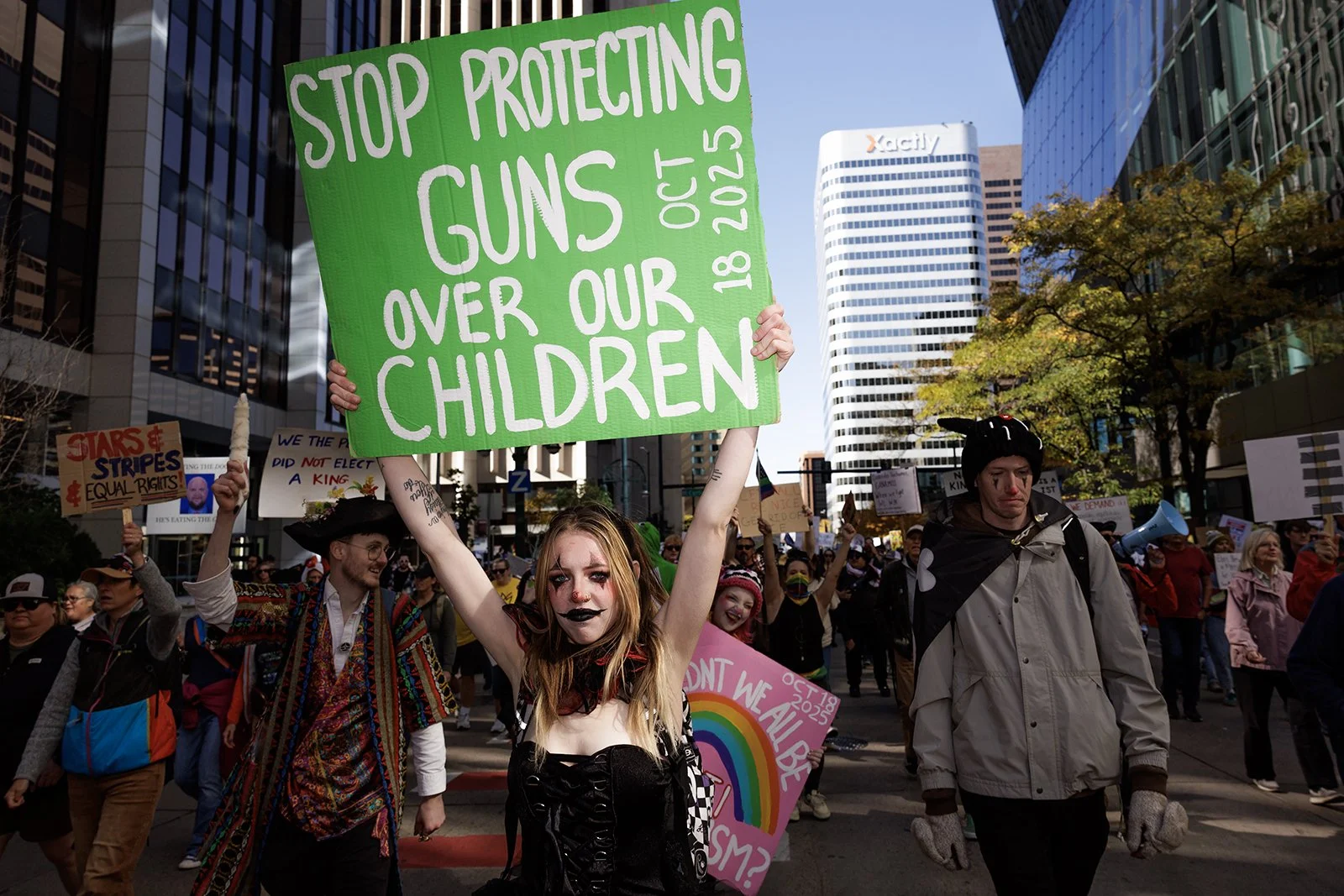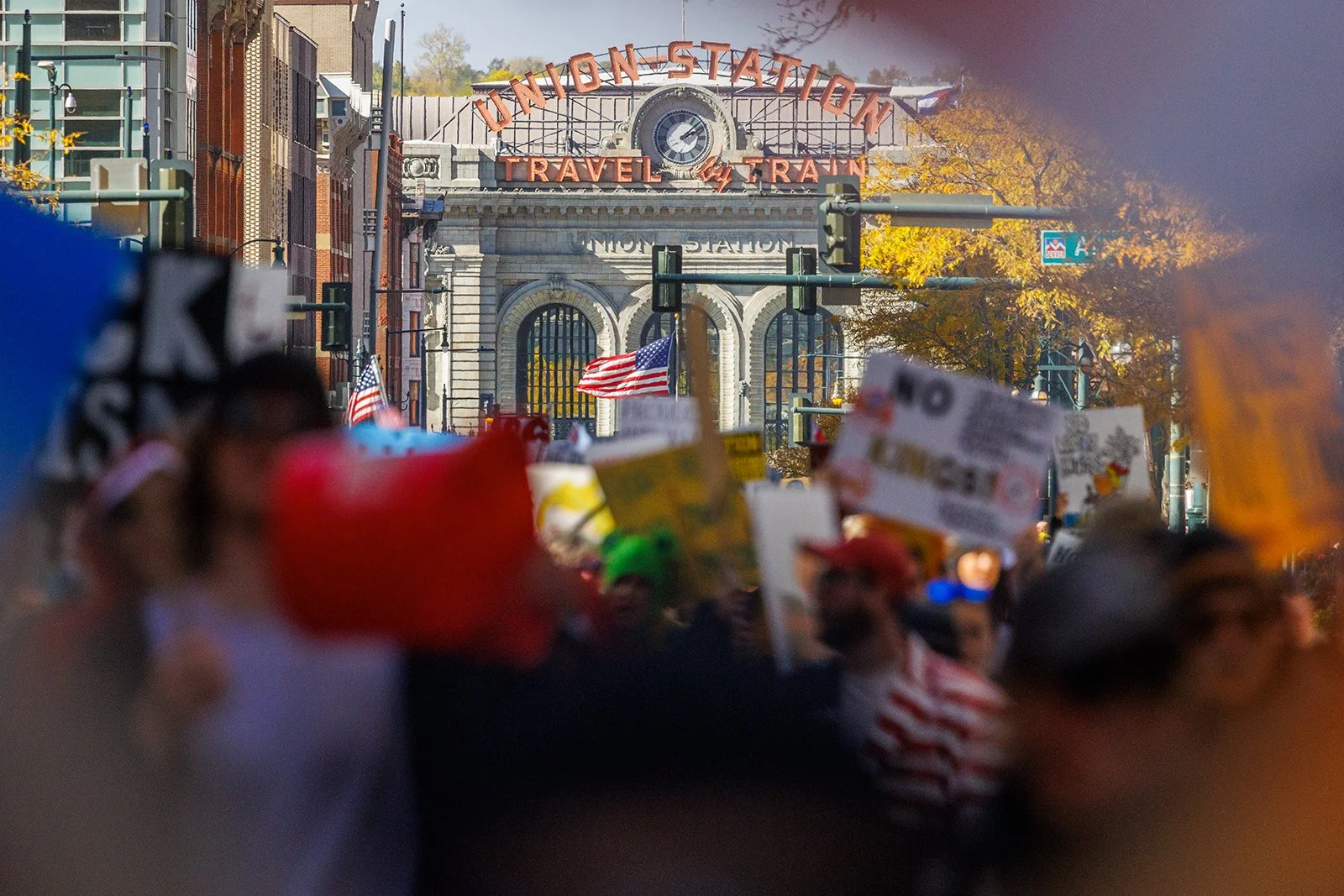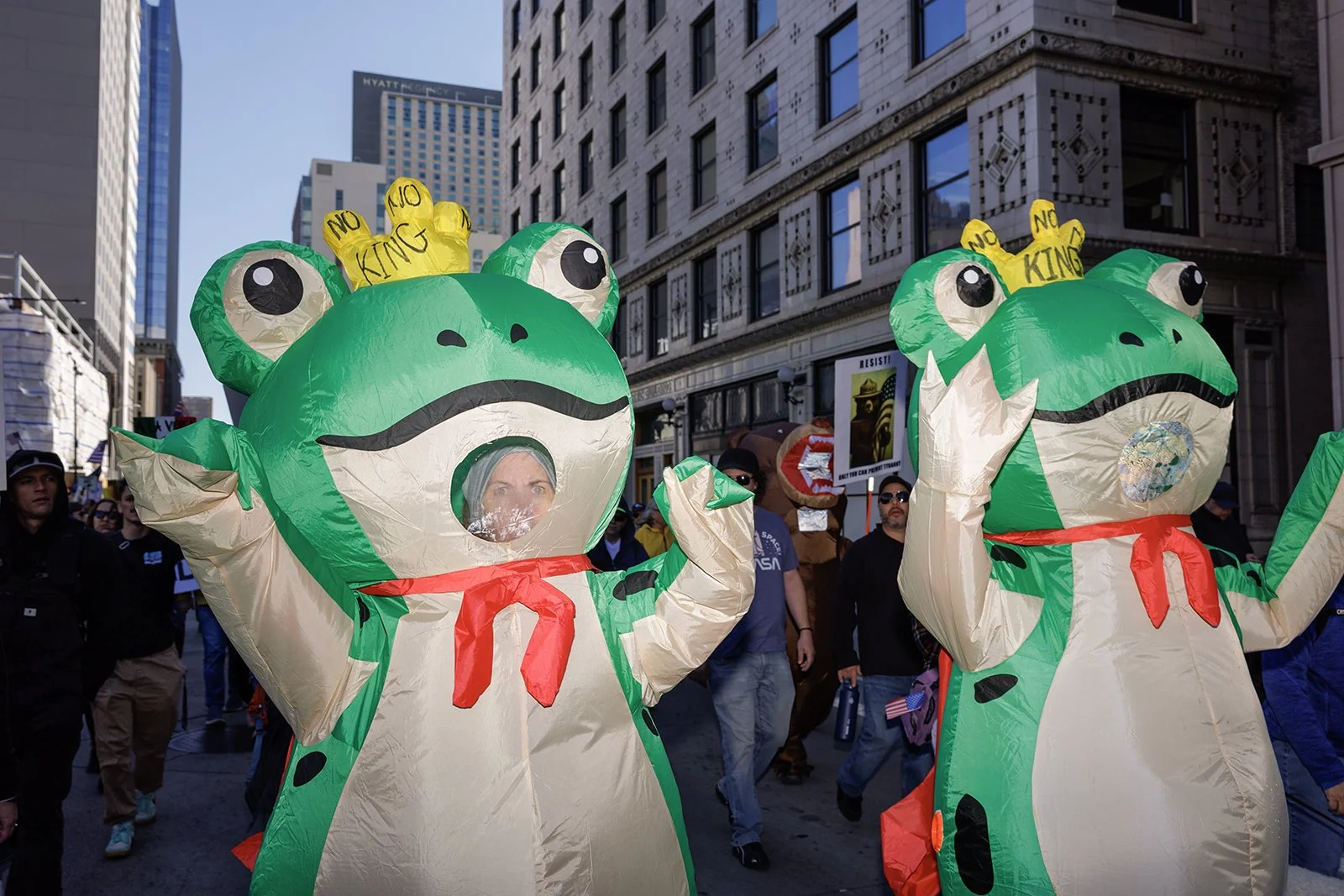Thousands Join Diverse Crowd at Denver’s ‘No Kings Day’ Protest
Peaceful demonstrators formed the largest protest in Denver against Donald Trump during his current term, joining a wave of “No Kings Day” rallies across Colorado and the United States.
Story and photos by Giles Clasen
Thousands of people protested in downtown Denver and at the State Capitol on Saturday during the “No Kings Day” demonstrations.
The diverse crowd included teachers and retirees, immigrants and veterans, union organizers and survivors of violence. They came in costumes, with drums and homemade signs, marching alongside families and longtime activists.
Together, the peaceful demonstrators formed the largest protest in Denver against Donald Trump during his current term, joining a wave of “No Kings Day” rallies across Colorado and the United States.
Rachel Case arrived early in an inflatable unicorn costume, one of many protesters in playful outfits such as frogs and dachshunds.
“I’m wearing a unicorn to bring visibility to the absurdity of the entire Trump crony nepotism government,Case said. “It is absurd, and it should be met with more absurdity.”
The event began with speeches at the Capitol before marchers moved through downtown.
Raven Payment, with the Missing and Murdered Indigenous Relatives Task Force, told the crowd, “I am worried [about] the perception that America was founded on greatness and that there is a period to which we should return. Let me be clear: we need a vision of newness because at no point has America ever been great for everyone.”












Payment called on those seeking change to move beyond words, urging action such as returning or co-managing land, protecting sacred sites, halting destructive development, shifting police budgets into housing and health care, funding reparations, and teaching honest history.
“Do not mistake this for hatred. This is love for our relations, human and more-than-human. This is love for the children who will inherit what we leave. That love looks fierce. It has to. Otherwise, our history repeats,” Payment said.
Demonstrators condemned what they described as a president acting like a monarch.
“I want to make sure that our democracy stands. I want to make sure the people have a voice and the right to choose our leaders. Our rights are being eroded constantly by Trump; our First Amendment rights, our Fourth Amendment rights are under attack. The President wants to overstretch his powers, and we can’t have it,” said Kyle, a protester who withheld his last name out of concern the administration is tracking opponents.
Immigration and Belonging











Immigration was a central theme for many participants.
“I’m fighting for the rights of the people, especially immigrants,” said Humberto Moreno, a U.S. citizen born in Texas to Mexican parents. “Immigrants make our communities better and more vibrant. They’re not all criminals. I’m not a criminal, and I’m Hispanic. Immigrants are here to work and make a living.”
Moses Medina said he opposed the use of ICE to terrorize immigrant communities.
“I feel like the constitution is being trampled on,” he said. “People need to come together and raise their voice against that way [the] administration has ICE in the streets arresting people and deporting them without due process.”
Others spoke about families still struggling for legal status.
“I was born here in Denver. But my family, who is here by some people’s point of view illegally, we came here to work and work hard. None of us has committed any crime… But the system doesn’t allow an affordable or easy way to citizenship for my mom,” said Carlos, who asked that his last name not be used.
Health Care, Disability, and Neurodiversity
Several attendees said health care rollbacks and attacks on disability rights drove them to the streets.
“Thirty million people are at risk of being priced out of their healthcare right now. Everything that we stand for is at risk,” said Heather Schichtel. “I’m not radical. I’m pretty middle of the road. I am a middle-class white woman, so I’m all right. But this is our future at risk. Our First Amendment rights are in jeopardy, and my grandparents died for that.”
Retired teacher Sherry Schulz echoed those fears.
“I’m a disabled woman, and it just seems every day it’s something new that’s being taken away from us,” she said. “I’m also a retired teacher, and they’ve dismantled the Department of Education… now [disabled students] will not get services either.”
Others focused on autism.
“I’m an autistic woman and a mother of an autistic son,” said Lizzie Schultz. “I need to get out of here so that we don’t get eugenics. [Autistic individuals] already work hard enough in public environments. And now we have to fight for the right to make our own decisions.”
LGBTQ+ Voices
Members of the LGBTQ+ community also spoke about survival and solidarity.
“It’s a threat to me by supporting trans and LGBTQIA youth,” said Dylan, a young trans protester. “They’re threatening to take away the rights to do that safely.”
Kenny, marching in a rubber duck mask, said Trump’s policies endangered everyone.
“I’m a bisexual man. I may feel safe, but if trans people and immigrants do not feel safe, then we’re all in danger. If they are attacking different ways of living, different types of love today, then tomorrow we’re all in danger. We stand together with all of our trans sisters and brothers.”
Later Clashes
After the larger protest ended, a smaller group marched down 16th Street. Approximately 50 individuals, a small fraction of the protestors involved in the "No Kings" day march, attempted to access I-25 at 20th Street.



Police in riot gear blocked the way, warning protesters they would use "all reasonable force" to deny access to the highway. Officers then used smoke and pepper balls to disperse the crowd.
The Denver Police Department later announced that 11 people were arrested in “secondary marches” not associated with the primary event.


